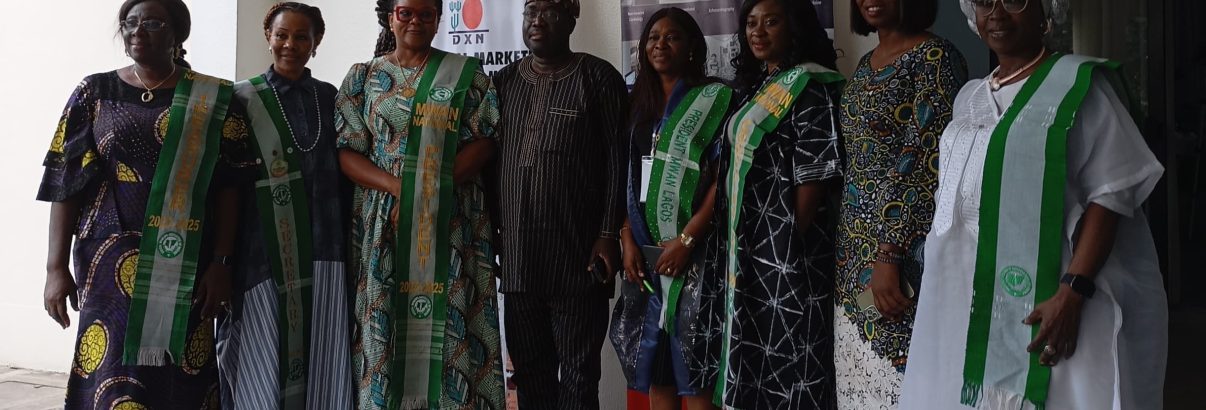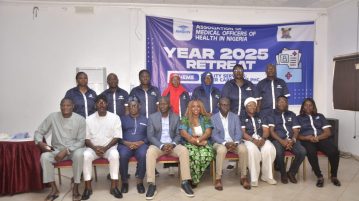On the 27th of July, 2024, the Lagos State branch of Medical Women’s Association of Nigeria (MWAN), hosted her National Executive Council’s Meeting with a scientific conference to discuss sickle cell disease (SCD) and the burden of its endemicity in recent times.
Hosted at Providence Hotel in GRA Ikeja, this event was graced by distinguished members of MWAN across Nigeria, prime stakeholders in the sickle cell community, not-for-profit sickle cell organisations, Special Assistant to the Lagos State Governor on Health, the Honourable Commissioner for Health in Lagos State – ably represented by the Executive Secretary of the Lagos State Blood Transfusion Service – as well as other healthcare professionals, including medical and dental students across Lagos State.
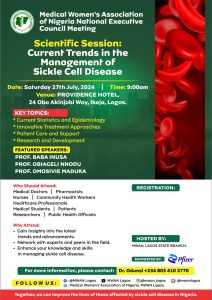
During one of the opening speeches by the Director of Sickle Cell Foundation of Nigeria, Dr Annette Akinsete commended the Medical Women’s Association of Nigeria (MWAN) for organizing a scientific session on the highly specialized theme of “Current Trends in the Management of Sickle Cell Disease”.
Nigeria has the world’s highest burden of sickle cell disease, with approximately 150,000 children born with the condition every year and a low estimated life expectancy of 21 years among those who survive beyond childhood ~ Adigwe et al., 2023; Ibemere et al., 2023; Cavanaugh, 2024.
Dr Akinsete also announced that the Sickle Cell Foundation, in partnership with Lagos University Teaching Hospital (LUTH), has established a Bone Marrow Transplantation clinic, which is currently recruiting patients. called on MWAN to key into the recent developments, nationally and to join in building better healthcare systems. She further emphasized the importance of research in this, why the government needs to invest in it and called on MWAN members with other attendees to key into the recent developments nationally, and join in building better healthcare systems across the nation.
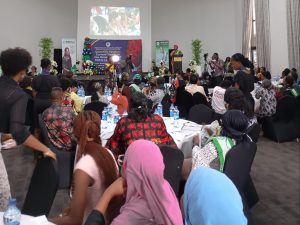
Prof Obiageli Nnodu during the first presentation titled “Burden and Local Context for the Management of SCD in Nigeria”, highlighted the gap in knowledge about Sickle Cell Disease (SCD) across Sub-Saharan Africa (especially Nigeria), where the disease is most prevalent, and noted that public awareness of the condition remains disturbingly low. Speaking extensively on the basic interventions for control of SCD – which include newborn screening, registry of patients with SCD for follow-up, screening for SCD at Primary Health Care Centres, and many more – Prof Nnodu encouraged the need to promote availability and affordability of SCD treatment options.
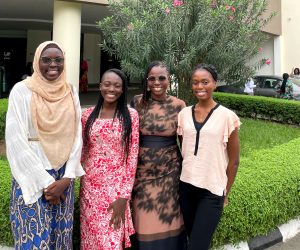
In the second session titled “Different Kinds of Treatment and Studies Ongoing for SCD”, Professor Miguel delivered a comprehensive presentation on treatment options readily available for Sickle Cell Disease, particularly focusing on hydroxyurea. Firmly advocating the prophylactic use of hydroxyurea, he stressed the importance of commencing hydroxyurea therapy in children born with SCD before 9 months of age, prior to the onset of organ damage and complications in them. Professor Miguel also dispelled concerns that the use of hydroxyurea may increase the risk of leukaemia, emphatically stating that there was no evidence yet to support this claim.
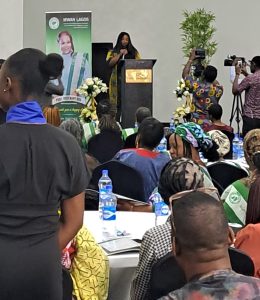
During the third session titled, “Drug Treatment in Sickle Cell Disease – Efficacy, Safety and Access’, Dr Ijeoma Akinwunmi – a Renowned LASUTH Consultant Paediatric Haematologist – spoke on the importance of comprehensive care in sickle cell champions from as early as the age of 2 – 3 months. She also emphasized the suitability of hydroxyurea in the management of SCD, specifically highlighting its benefits that: Hydroxyurea prevents acute and chronic complications of SCD. It also reduces pain episodes, acute chest syndrome, and blood transfusions by 50%.
According to Dr Akinwunmi, Folic acid, Vitamin B complex, Proguanil, Erythromycin, Amoxicillin, Acetaminophen, and Cocodamol are some of the drugs classified as Early Access Drugs for SCD management in Nigeria. While Penicillin V tabs and Hydroxyurea are classified as drugs with suboptimal access.
Summarily, this groundbreaking event by MWAN was timely and good will messages was received from various well-wishers such as Prof. Folasade Ogunsola – ably represented by Prof. Folasade Akinsola, Dr C. George of Pfizer, and Dr Akinsiku – who represented the MD/CEO of FMC Ebute Metta, just to mention a few.
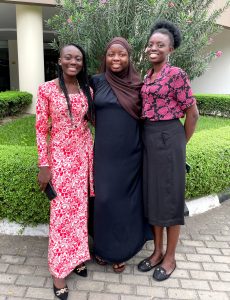
Editor’s note:
This report was collated by Medical Mirror Correspondent, Durodola Ayomide
Durodola Ayomide, is a student of the Lagos State University College of Medicine who enjoys reading, writing short stories, and singing. She is most passionate about creating awareness and proffering solution to sickle cell disease management, treatment and prevention, as well as other diseases. She is a young lady with great enthusiasm and resilience for a better Nigeria, Africa and Globe. Her guiding philosophy is embodied in Alfred Nobel’s quote: “For the greatest benefit to humankind.”

